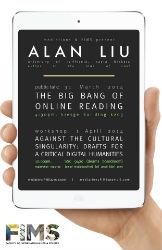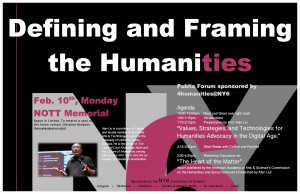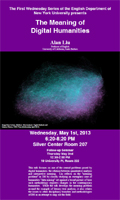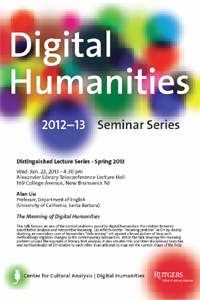| 2014 |
“Rediscovering the Humanities: Humanities Advocacy in the Digital Age” (Bard C.)Categories Talks Talks
|
“Rediscovering the Humanities: Humanities Advocacy in the Digital Age.” Experimental Humanities program, Bard College. 6 November 2014.
- Abstract: How can liberal arts colleges, teachers, and students make the case for the value of the humanities to the public today? Starting with the example of the 4Humanities.org advocacy initiative that he co-founded, Alan Liu will discuss strategies of communicating the values of the humanities in today’s society. A special emphasis of the talk is the promise of new digital technologies for public engagement in the humanities.





